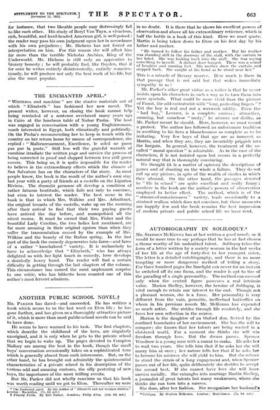ANOTHER PUBLIC SCHOOL NOVEL.f MR. PAAKER has dared—and succeeded. He
has written a book which seems to us the last word on Eton life ; he has gone further, and has given us a thoroughly attractive picture of it, which is more than most public-school novels can be said to have done.
He seems to have warmed to his task. The first chapters, which describe the childhood of the hero, are singularly unoriginal, and it is only when he gets to the private school that we begin to wake up. The pages devoted to Compton Mallory are among the best in the book, though the small boys' conversation occasionally takes on a sophisticated tone which is generally absent from such intercourse. But, on the other hand, he has brought out admirably the quintessential characteristics of a private school in his description of the various odd and amusing customs, the silly pestering of new boys, the importance of the most trifling events, But Mr. Parker did not wholly convince us that his book was worth readi cr until we got to Eton. Thereafter we were • The Enchanted April. By. the Author of " Elizabeth and her German clarden." Lyndon : Macmillan. [78.41d. net.] Playing Fields. By Eric Parker. London.% Philip Allen, L1.0 s. 6d. net.] in no doubt. It is there that he shows his excellent powers of observation and above all his extraordinary reticence, which is half the battle in a book of this kind. Here we must quote. Martin is being taken down to Eton on. his first day by his father and mother.
" He turned to follow his father and mother. But his mother was standing still in the doorway of the stall, with the curtain in her hand. She was looking back into the stall. She was saying something to herself. A distant door banged. There was a sound of laughter and running feet. His mother drew the curtain and stepped back. She caught at his hand as he stood near her."
This is a miracle of literary reserve. How much is there in that passage that is not said but that wakes immediate syinpathy in us !
Mr. Parker's other great virtue as a writer is that he never insists upon his characters in such a way as to turn them into mere symbols. What could be more vivid than the picture of Fatmt, the odd caricaturist with "long, protesting fingers " ? Yet the boy is real and not a waxwork oddity. Even the " bad boy," Leverer, is a complete success ; attractive, amusing, but somehow " nasty," he arouses our dislike, as Mr. Parker meant he should. Here, however, we must record a protest. The author has followed an unfortunate tradition in ascribing to his hero a blamelessness so complete as to be irritating. Very few boys of that . age are as innocent as Martin, and when they are, they are invariably priggish into the bargain. In general, however, the treatment of the so- called " moral question " is admirable. As in the case of the characters, it is not insisted upon but occurs in a perfectly natural way that is thoroughly convincing.
We thought (it is a matter of opinion) the descriptions of games and of shooting on the whole a failure. They do not call up any picture, in spite of the wealth of similes in which they abound. On the other hand, the passages devoted to " life in school " are quite excellent and really funny ; nowhere in the book are the author's powers of observation employed to better effect. The method, which is of the stream-of-consciousness " variety, leads occasionally to a strained realism which does not convince, but these moments are happily few and the book remains the best impression of modern private and public school life we have read.


























































 Previous page
Previous page